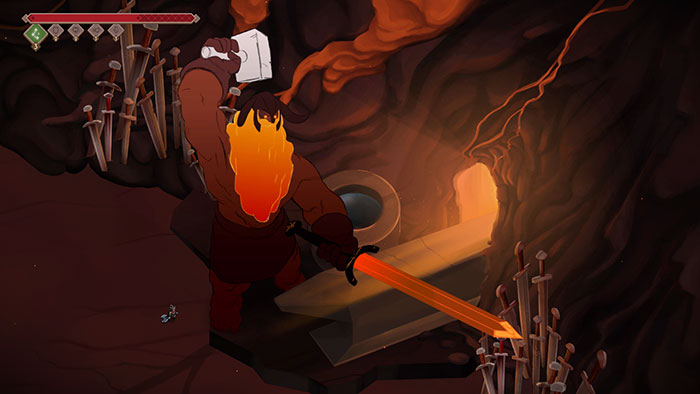
The only thing this game has going for it is its art direction. There’s some wonderful hand-drawn characters and evocative music. However, like a Doublefine game, this one is all style and no substance. The highlight is supposed to be the various boss battles in which you spend a ton of time chopping at these giant character’s heels. Every swing of your axe removes about 1% of the enemy’s health. It’s just an exercise in tedium. The controls are sluggish and un-responsive . It’s like fighting in a bowl of molasses.
Between these boss battles you have to wander through several immense and mostly empty levels looking for the keys to the bosses. These levels are pointless and super-boring. Free might be a bit too much to have paid for this game.

The chapters on Free Masonry and The Golden Dawn were pretty informative. I think my big takeaway about these sects was not so much that they are dark subcultures that secretly control the world, but rather, that well-to-do people will come up some really goofy extracurricular activities just to feel out of the ordinary (the 19th century equivalent of a polar plunge or costumed 4K fun-run). Oh, and Aleister Crowley was a big, pervy jerk.

A murder mystery on a sparsely populated planet where each person lives isolated from everyone else and all the work is done by robots. Since the robots must follow the first law and nobody can stand proximity to other humans, who committed the murder? Turns out, the answer isn’t all that interesting and neither was this book.

Another cult movie which I’ve known about forever, but never bothered to watch. I didn’t expect this to be as cheap as it was. Fortunately the story is just crazy enough to keep it very entertaining and the terrible monster effects add a lot of charm. This would make a good double feature with The Oily Maniac. There’s an overly long expositional flashback in the middle of the movie and some cringey male nudity that leads up to the finale.

The premise here is that the outsiders and the misfits, by rejecting puritanism and pushing the limits of what is acceptable, are the real driving force behind the expansion of our freedoms. I agree with the argument up to a point. Ya know, a lot of renegades are just annoying self-important jerks whose art is dumb. Us normies will inherit the Earth. Anyhow, the history ranges from drunk patriots to drag queens. Thrown in for good measure are some provocative defenses of minstrel shows and money-grubbing cultish black ministers. Oh, and lists of things. The more things in the list, the more you make your point apparently. There are lists in chapter one, chapter two, chapter three, chapter four… we get the point.

I think it’s telling that throughout this book the author in constantly having to backtrack and clarify what he means by empathy. Compassion and caring are desirable close cousins to empathy, but the big E itself is overrated. He eventually makes his point that calm, reasoned thinking is a better approach to decision-making than feeling someone’s pain. It’s a hard pill to swallow, and I don’t think I’m completely sold on the idea. But, for the most part, his case is solid, especially when talking about broader policy choices.

Lo Lieh plays the sword wielding bounty hunter in this Shaw Bros. film from 1969. The story is simple and the sets are limited to a few locations. I think the entire first quarter of this movie takes place in a field of reeds. But the whole thing is masterfully shot and felt a lot like Dirty Ho in terms of style. The story is very similar to Killer Constable in which a blind woman plays a key role in between the main characters. Overall, had a nice spaghetti western feel to it.

Italian police thriller in which the lead cop is as corrupt as they come and yet we are supposed to root for him? Has a bit of style and a nihilistic ending at least.

Jeez, this one felt like sitting through a two hour school board meeting. 95% of the movie is just politicians sitting in rooms talking amongst themselves about the political implications of fighting Godzilla. It’s a technocrat’s wet dream. The solution to any problem is to make elaborate top-down plans that send thousands of soldiers and civilians to their deaths, congratulate themselves, and then get back to the important stuff like worrying about the next election cycle. Don’t be fooled by the impressive stills of a modernized Godzilla demolishing buildings. This one’s a stinker.

The plot of this one is a bit all over the place. A swordsman with a cough returns home to visit his long time friend and the girl who he had hope the friend would marry. Then he gets caught up in a plot to stop the Plum Blossom Bandit, a pink ninja who kills with flower darts. In the meantime he befriends a poor, wandering swordsman, but then gets accused of being a bandit himself and needs to be taken to a Shaolin Temple. It doesn’t make much sense until the very end, and, even then, it’s a bit of a stretch. Watch this one for the colorful costumes and the ridiculous enemies.



